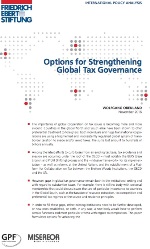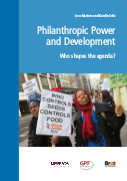Germany
Published on Mon, 2016-12-19 14:07
In an unprecedented and historic move, the Sixth Committee of the UN General Assembly recently granted observer status to the International Chamber of Commerce (ICC). The resolution was submitted by France, Albania, Colombia, the Netherlands and Tunisia and was adopted during the seventy-first session of the General Assembly. The resolution sets out the ICC’s position as observer in the General Assembly from 1 January 2017 on.
|
Published on Thu, 2016-12-01 15:10
The importance of global cooperation on tax issues is becoming more and more evident. The sums lost amount to hundreds of billions annually. While steps to curb the losses are underway, gaps in global tax governance remain both in the institutional setting and with regard to substantive issues. For example, there is still no body with universal membership that could discuss issues that are of particular importance to countries in the Global South. In order to fill these gaps, either existing institutions need to be further developed, or new ones established, or both. In any case, a new body would have to perform certain functions and meet particular criteria with regard to composition. A new paper formulates options for achieving this.
|
Published on Fri, 2016-09-16 09:15
The 2030 Agenda and its 17 Sustainable Development Goals (SDGs) comprises a number of goals which concern the internal situation in Germany. Among these are goals which derive from the human rights obligations, such as in the areas of education, health and social security. Examples include reducing the proportion of poor people in Germany by half and increasing the proportion of young people who complete secondary education.
Other goals address the external effects of German politics and economy. They demand domestic measures which also have immediate impacts for people in the countries of the South. These include goals for reducing resource use, for changing unsustainable consumption and production patterns, but also for the relationship to migrants and refugees.
|
|
The 2030 Agenda and its 17 Sustainable Development Goals (SDGs) comprises a number of goals which concern the internal situation in Germany. Among these are goals which derive from the human rights obligations, such as in the areas of education, health and social security. Examples include reducing the proportion of poor people in Germany by half and increasing the proportion of young people who complete secondary education.
Other goals address the external effects of German politics and economy. They demand domestic measures which also have immediate impacts for people in the countries of the South. These include goals for reducing resource use, for changing unsustainable consumption and production patterns, but also for the relationship to migrants and refugees.
Still other goals go to Germany’s international responsibility and solidarity. Besides the traditional development policy obligations the corresponding targets concern all areas of structural policies, particularly trade, investment and finance.
|
|
Source: 
. Published on Wed, 2016-06-15 00:00
Varios expertos discutieron sobre los beneficios y perjuicios de las alianzas público-privadas en el sector de la ayuda para el desarrollo. Entre ellos, Roberto Bissio, Coordinador de Social Watch.
|
Published on Fri, 2015-12-04 09:09
New study, released today by Global Policy Forum, examines the role and impact of philanthropic foundations in development. It addresses the impacts and side effects of philanthropic engagement by taking a closer look at the priorities and operations of two of the most prominent foundations, the Rockefeller Foundation and the Bill & Melinda Gates Foundation, in two crucial sectors, health and agriculture. So far, there has been a fairly willing belief among governments and international organizations in the positive role of philanthropy in global development. But in light of experiences in the areas of health, food, nutrition and agriculture, which are discussed in this working paper, a thorough assessment of the impacts and side effects of philanthropic engagement is necessary. The important role being allocated to the philanthropic sector in the 2030 Sustainable Development Agenda makes the discussion of its role a matter of urgency.
|
Published on Fri, 2015-09-25 08:46
More than a hundred Heads of State and Government will gather in New York this week to adopt the 2030 Agenda for Sustainable Development. This agenda is intended to make the UN ‘fit for purpose’, but it is important to ask, ‘whose purpose will it be fit for’?
A new study from Global Policy Forum warns that the United Nations is embarking on a new era of selective multilateralism, shaped by intergovernmental policy impasses and a growing reliance on corporate-led solutions to global problems. The changing funding patterns of the UN and its funds, programmes and specialized agencies reflect these alarming trends. Key features are the growing gap between the scale of global problems and the (financial) capacity of the UN to solve them; the growing share of non-core contributions and earmarked trust funds in UN finance; increased reliance on the corporate sector; and the outsourcing of funding and decision-making to exclusive global partnerships.
|
Published on Fri, 2014-12-05 23:00
The principle of common but differentiated responsibilities (CBDR) is considered one of the key achievements of the UN Conference on Environment and Development in Rio de Janeiro in 1992. Twenty years later, this principle has become a focal point of current negotiations on climate change and the post-2015 agenda. The developing countries that make up the Group of 77 want to preserve the principle unchanged. However, the US, EU and other industrialized countries want to do away with it in its present form. They argue that global power structures have changed. In their view, fair burden sharing must include contributions to climate protection from emerging economies like China, India and Brazil. "If consensus cannot be found, there will be neither a new global climate treaty nor a global development agenda worthy of the name in 2015" writes Global Policy Forum's director, Jens Martens.
|
|
Source: 
. Published on Wed, 2014-06-25 00:00
When the United Nations began negotiating a Code of Conduct for Transnational Corporations (TNCs) back in the 1970s, the proposal never got off the ground because of vigourous opposition both from the powerful business community and its Western allies.
|
Published on Thu, 2014-05-15 09:21

Gustave Assah.
|
The participants in the civil society strategy meeting on monitoring and accountability organized by Social Watch last february in Montevideo were asked about how they personally work and relate with the huge task of making the powerful accountable. Here is what they said:
|

|












